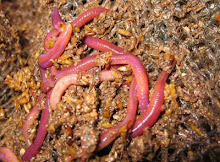
When you examine vermicomposting sites on the Internet,there seems to be a great deal of confusion regarding what one calls the dark brown liquid that's produced as a by-product of the worm bin, and which must periodically be drained from the side spigot.
This liquid is properly called leachate, which the Oxford English Dictionary On-line defines as "(A quantity of) liquid that has percolated through a solid and leached (extracted) out some of the constituents." The University of Hawaii's College of Tropical Agriculture and Human Resources (UH-CTAHR), in their August 2005 publication HG-45, "Small-Scale Vermicomposting" (Selden, DuPonte, et al) notes that leachate may "have a slight odor" and "can be used full-strength or mixed with water. Use it to water plants or dispose of it on your compost pile." S. Zorba Frankel, in "Compost Tea or Leachate" from Worm Digest #22, however, warns that watering with leachate might not, be good for plants: "When a liquid seeps through a material containing decomposing organic matter, some of that organic matter is carried along in the water. When it leaves the system, carrying with it undecomposed organic matter, we call it leachate. Now, water does not allow enough oxygen to diffuse into it to support aerobic microorganisms, and so anaerobic micororganisms are encouraged. These anaerobes produce some undesirable byproducts that are not good for plants."
In contrast to leachate, "worm compost `tea' is made from finished compost and involves a separate process" (UH-CTAHR's HG-45). Vermicast tea, sometimes known as worm tea, is a suspension made by soaking finished castings in water. The resulting "tea" can be used either as liquid fertilizer to water plants, or as a topical foliar application.
Here's a simple vermicast tea recipe, from tcdutch at the GardenWeb vermicompost forum: "take two tablespoons vermicompost and add it to one quart of water. Let it steep for a day, mixing occasionally. Then add it to your plants or spray it on their leaves."
You can find a more complicated recipe for aerated compost tea at the Pennsylvania Department of Environmental Protection. They state that compost tea is a sustainable and safer alternative to chemical-based fertilizers, pesticides, and fungicides and offers the following benefits:
* Increases plant growth
* Provides nutrients to plants and soil
* Provides beneficial organisms
* Helps to supress diseases
* Replaces toxic garden chemicals
For added nutritive benefit, one can also add seaweed emulsion or fish emulsion, presumably for the extra nitrogen. Why aerate, you ask, when the 2T vermicast + 1 qt. H20 is so simple? Here's why: oxygenating the tea helps create aerobic conditions that reduce phytotoxins and phytopathogens, a.k.a. things which can damage and/or kill your plants.
While browsing articles on compost tea, I came across an NPR audio file and article on compost soup, from Ketzel Levine's series, Talking Plants.
To find out more about the science behind compost tea and how it does all of the above, check out this fascinating article by microbial ecologist, Elaine Ingham. Ingham underscores that compost tea enhances beneficial microorganisms in the soil foodweb, organisms that die when we pollute the air or use conventional fertilizers and pesticides to kill off harmful bacteria, protozoa, nematodes, and fungi.


No comments:
Post a Comment